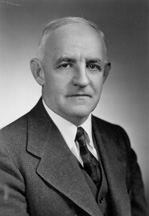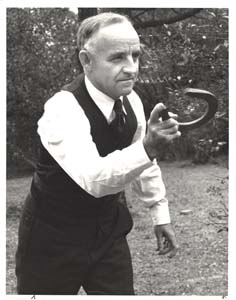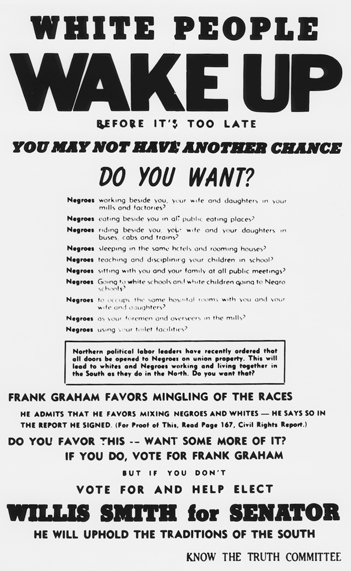14 Oct. 1886–16 Feb. 1972

Frank Porter Graham, university president, U.S. senator, and United Nations mediator, was born in Fayetteville, the son of Alexander and Katherine Bryan Sloan Graham. His father was a major founder of the public schools in Fayetteville and superintendent of the Charlotte school system for twenty-five years. Frank Graham was graduated from the Charlotte High School and received an A.B. degree (Phi Beta Kappa) from The University of North Carolina in 1909. As a student at Chapel Hill, he made many warm and lasting friends who were his staunch supporters in his later career. He also studied law at the university and received a law license although he never practiced. He pursued graduate work in history at Columbia University, from which he received the A.M. degree in 1916, the University of Chicago (winning the Amherst Memorial Fellowship), the Brookings Institution, and the London School of Economics.
After beginning his teaching career in the Raleigh High School for two years, he returned to Chapel Hill as secretary of the campus YMCA. In 1914, he was appointed an instructor in history and began those years of brilliant classroom teaching that were to influence the lives of countless undergraduates who enrolled in his courses. His academic career was interrupted by volunteer service in the U.S. Marine Corps in World War I, in which he rose from the rank of private to first lieutenant. He returned to The University of North Carolina as an assistant professor and served for a time as dean of students. He was made an associate professor in 1925, and even though his graduate study had not resulted in the doctorate, his outstanding teaching earned him the rank of professor of history in 1927.
Graham was certainly one of the university's best and most highly regarded teachers. His interest in students and the stimulating quality of his classes attracted a large and diverse following, including the gifted and serious students as well as many of those who despite limited interest in scholarship found his provocative presentation of history appealing.

In addition to his university activities, Graham's active support of a progressive program of expansion of schools, colleges, and good roads for the state during the administration of Governor Cameron Morrison influenced many of the state's leaders to think of him for a larger role. When The University of North Carolina presidency became vacant in 1930, he was named president. With the merger of the university in Chapel Hill, North Carolina State College, and the North Carolina College for Women into the Consolidated University of North Carolina in 1932, Graham became its first president, a position he held until 1949.
Graham's presidency of The University of North Carolina coincided with a critical era in the nation's history—the era of the Great Depression and World War II and its aftermath. During the 1920s the university had attained increasing stature as one of the nation's leading universities, exemplified by its election to the American Association of Universities. In the face of critically short financial support, Graham labored mightily and successfully to maintain the university's stature in the world of higher education. With so many North Carolinians unable to afford a college education, he worked tirelessly to raise scholarship funds for needy students.
In an era of intense and sometimes fierce controversy over political, social and economic policies, Graham courageously defended the essential freedoms of the university—freedom to seek, freedom to learn, freedom to believe, freedom to speak, and freedom to publish. Although on occasion he himself was subject to personal attack for supporting unpopular causes or persons, he never wavered in his belief in the young and in the future of a free, democratic society.
Graham did not limit his interests and commitments to the university and the educational world, but devoted much of his time, thought, and energies to the needs of the poor and the deprived during the depression. He was twice president of the North Carolina Conference for Social Service. He joined and took an active part in organizations promoting social change and responded to President Franklin D. Roosevelt's call to serve on federal boards and commissions, including the National Advisory Council on Social Security of which he was chairman.

During World War II, Graham gave much of his time to public service, first as a member of the National Defense Mediation Board and then of the National War Labor Board. In 1946, President Harry S Truman appointed Graham to the President's Committee on Civil Rights, which in 1947 made a historic report on the nation's racial problems and proposals for their solution. In 1947, Truman called on him to serve as the U.S. Representative, along with representatives from Australia and Belgium, on the United Nations Committee of Good Offices on the Dutch-Indonesian dispute. This committee's efforts contributed significantly to a final settlement. During those early postwar years, he also helped organize and was the first president of the Oak Ridge Institute of Nuclear Studies (1946–49).
In 1949, Graham's career took a new turn when he was appointed by Governor Kerr Scott to fill an unexpired term in the U.S. Senate. In his bid for renomination, though he was far in the lead, he failed to win a majority in the Democratic primary by a few thousand votes. He was narrowly defeated in the second primary by Willis Smith in a heatedly contested election in which the winning side used the racial issue extensively to Graham's disadvantage. Despite urging by some of his advisers, Graham refused to respond in kind. Just prior to the second primary the United States Supreme Court rendered a decision looking toward desegregation of public education. In this context and in the type of campaign conducted by his opponents, although he had taken no public position in support of desegregation, Graham's membership on the President's Committee on Civil Rights and his widely known commitment to human rights and association with many liberal causes made him politically vulnerable and contributed substantially to his defeat.
After serving briefly as defense manpower administrator for the U.S. Department of Labor, in 1951 he was appointed United Nations representative to mediate the dispute between India and Pakistan over Kashmir. Although he devoted the remainder of his active life to this intransigent issue, with persistence and patience, he was unable to achieve a settlement. As an assistant secretary general of the United Nations, he made hundreds of speeches over the years to religious, labor, and civic groups advocating world peace and the role of the United Nations in achieving a peaceful world order.
Throughout his long, varied, and distinguished career, Graham received many awards and honors including honorary degrees from more than twenty colleges and universities, among them Amherst, Birmingham Southern, Catawba, Columbia, Davidson, Duke, Harvard, Hebrew Union, North Carolina A. and T., University of North Carolina (at Chapel Hill, Charlotte, and Greensboro), North Carolina State, Princeton, Shaw, Swarthmore, Temple, Wake Forest, William and Mary, and William Jewel. The new (1968) student union building on the Chapel Hill campus is named for Graham.
A deeply religious man, Frank Graham was active and influential in the work of the Presbyterian church. More importantly, the Christian faith was the basis of his personal philosophy and a constant guide throughout his life.
In July 1932 Graham married Marian Drane and until her death in April 1967 she was his devoted companion. They had no children. Graham died in Chapel Hill and was buried in the old Chapel Hill Cemetery. There are portraits in the Morehead Planetarium, the student union building, and the General Administration Building in Chapel Hill.